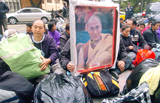Tibetan refugees yesterday threatened to stage another sit-in if the Mongolian and Tibetan Affairs Commission (MTAC) refused to grant them residency permits as promised.
Tibetan Welfare Association chairman Jamga (蔣卡) said that although the government had promised to give his compatriots legal residency status, it was now tightening application criteria, making it difficult for them to obtain permits.
“We were overjoyed when the Immigration Act [入出國及移民法)] was amended before the Lunar New Year, making it possible for us to get permits, and President Ma Ying-jeou [馬英九] also said that he cared about us and would help us,” Jamga told reporters.

PHOTO: CHANG CHIA-MING, TAIPEI TIMES
“However, after several explanatory meetings, more and more of us have been disqualified from obtaining permits for various reasons. We don’t know how many people will be granted residency in the end and feel cheated by the government,” he said.
Over 100 Tibetan refugees without legal status staged a sit-in demonstration at Liberty Square last December, asking the government to grant them asylum. The demonstration ended when the refugees received temporary residency permits in January.
Many of the Tibetan refugees crossed through the Himalayas to Nepal and India before arriving in Taiwan using forged Nepalese or Indian passports.
The amended law stipulates that the refugees must provide legal documents to prove their identity as Tibetans, Jamga said.
The document can be either the applicant’s birth certificate (or that of his/her parents), passport, Indian Identity Certificate (IC, issued by the Indian government to stateless refugees) or their Independent Book (commonly known as the Green Book, a document proving they pay taxes to the Tibetan government in exile in India), Jamga said.
“But while constantly moving, many of us have lost our documents or never had such documents [to begin with],” he said.
In addition, Jamga said that while National Immigration Agency (NIA) officials had told them in their first meeting that holders of Indian ICs would get priority, in the third meeting officials said those whose Indian ICs were still valid would be repatriated to India immediately.
“This terrifies us; if we are sent back, we may face imprisonment or even execution,” he said.
Even without being repatriated, without legal residency the refugees have no right to work, said Awansangdan, another Tibetan.
“We are now having difficulty buying food and paying rent. We have relied on donations from our Taiwanese friends, but we are at the end of our resources. We are pleading for the government to give us residency,” he said.
In response, MTAC Secretary-General Chien Shih-yin (錢世英) said that the priority was to help the refugees stay in Taiwan legally, but it would take time.
“The commission has employed very loose criteria for residency application ... I understand that [the refugees] have been through a lot, but the commission wants them to attain residency status legally so they must provide something [as opposed to verbal promises] to prove their identities,” Chien said.
Commission staffers have been working overtime since the Lunar New Year to help the refugees, Chien said, but the whole process will take a few months.
“There will be no immediate repatriations,” Chien said. “There may have been misunderstandings between the refugees and frontline staff.”

‘DENIAL DEFENSE’: The US would increase its military presence with uncrewed ships, and submarines, while boosting defense in the Indo-Pacific, a Pete Hegseth memo said The US is reorienting its military strategy to focus primarily on deterring a potential Chinese invasion of Taiwan, a memo signed by US Secretary of Defense Pete Hegseth showed. The memo also called on Taiwan to increase its defense spending. The document, known as the “Interim National Defense Strategic Guidance,” was distributed this month and detailed the national defense plans of US President Donald Trump’s administration, an article in the Washington Post said on Saturday. It outlines how the US can prepare for a potential war with China and defend itself from threats in the “near abroad,” including Greenland and the Panama

A wild live dugong was found in Taiwan for the first time in 88 years, after it was accidentally caught by a fisher’s net on Tuesday in Yilan County’s Fenniaolin (粉鳥林). This is the first sighting of the species in Taiwan since 1937, having already been considered “extinct” in the country and considered as “vulnerable” by the International Union for Conservation of Nature. A fisher surnamed Chen (陳) went to Fenniaolin to collect the fish in his netting, but instead caught a 3m long, 500kg dugong. The fisher released the animal back into the wild, not realizing it was an endangered species at

The Chinese Nationalist Party (KMT) is maintaining close ties with Beijing, the Democratic Progressive Party (DPP) said yesterday, hours after a new round of Chinese military drills in the Taiwan Strait began. Political parties in a democracy have a responsibility to be loyal to the nation and defend its sovereignty, DPP spokesman Justin Wu (吳崢) told a news conference in Taipei. His comments came hours after Beijing announced via Chinese state media that the Chinese People’s Liberation Army’s Eastern Theater Command was holding large-scale drills simulating a multi-pronged attack on Taiwan. Contrary to the KMT’s claims that it is staunchly anti-communist, KMT Deputy

The High Prosecutors’ Office yesterday withdrew an appeal against the acquittal of a former bank manager 22 years after his death, marking Taiwan’s first instance of prosecutors rendering posthumous justice to a wrongfully convicted defendant. Chu Ching-en (諸慶恩) — formerly a manager at the Taipei branch of BNP Paribas — was in 1999 accused by Weng Mao-chung (翁茂鍾), then-president of Chia Her Industrial Co, of forging a request for a fixed deposit of US$10 million by I-Hwa Industrial Co, a subsidiary of Chia Her, which was used as collateral. Chu was ruled not guilty in the first trial, but was found guilty